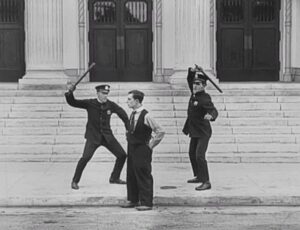
In a series of tweets on November 9, “serial technology entrepreneur” Dave Troy outlines his view of cryptocurrency as “an ideologically-driven attack on the legitimacy of fiat currency, the
@federalreserve, and the incumbent financial system,” and “the sequel to the January 6th” Capitol riot.
Let’s dispense with the latter charge first: There’s no merit to it whatsoever.
Cryptocurrency came into existence years before Trumpism was so much as a gleam in the Republican Party’s eye, and was conceived in large part as a method of separating money and state.
The Capitol riot, on the other hand, was no more than a tawdry tantrum of preference over which tyrant was entitled to crack the whip of government over the “incumbent financial system.”
In short, the Capitol rioters have far more in common with Dave Troy than with Satoshi Nakamoto, Bitcoin’s pseudonymous creator.
Troy is partly right, though, in claiming that cryptocurrency constitutes “an ideologically-driven attack on the legitimacy of fiat currency” in general and on the Federal Reserve itself.
That doesn’t mean that the many people involved in cryptocurrency, from miners to exchange operators to individual holders, are all wild-eyed anarchist revolutionaries like me. Far from it. For the most part, they’re no different than any other class of investor, entrepreneur, or consumer. They see something of value and they want to profit from it, or at least make good use of it. For most of them, it’s no more ideological than buying a share of Apple or a loaf of bread.
But for us ideologues, yes, the purpose of cryptocurrency is to seize control of money from the political class and distribute that control widely among free markets and individual people. That would be a good thing, not a bad thing, and to understand why we need look no further than the current worries over inflation.
America’s central bankers claim that recent inflation — supposedly annualizing to more than 6% at the moment, but probably much higher — is “transitory,” while politicians either claim confusion as to its cause or attribute it to convenient distractions.
Inflation happens when the money supply increases faster than the production of goods and services for purchase with that money. Period. Rising prices aren’t inflation, they’re just a symptom of inflation.
The Fed has spent the last two years magically creating new dollars out of thin air far faster than the economy can absorb those dollars with production of goods and services to sell.
Why? So that Congress can borrow those magical dollars and spend them on whatever the political class happens to want … in the process, reducing the value of the dollars you earned with actual productive work.
While it’s a stretch to claim that cryptocurrency is immune to government manipulation, it’s at least immune to arbitrary creation by government. Cryptocurrency makes it harder for the politicians to steal from you. That’s why the political class hates and fears it.
Giving government control of money was one of our worst mistakes. Cryptocurrency is how we’re correcting that mistake.
Thomas L. Knapp (Twitter: @thomaslknapp) is director and senior news analyst at the William Lloyd Garrison Center for Libertarian Advocacy Journalism (thegarrisoncenter.org). He lives and works in north central Florida.
PUBLICATION HISTORY
- “Cryptocurrency: Dave Troy is Partly Right, But on the Wrong Side,” by Thomas L. Knapp, Anchorage, Alaska Press, 11/12/21
- “Cryptocurrency gives power to the people,” by Thomas L. Knapp, Palos Heights, Illinois Reporter, 11/13/21
- “Cryptocurrency: Dave Troy Is Partly Right, But On The Wrong Side,” Ventura County, California Citizens Journal, 11/15/21
- “The Politics of Crypto,” by Thomas L. Knapp, CounterPunch, 11/15/21
- “Cryptocurrency: Dave Troy is Partly Right, But on the Wrong Side,” by Thomas L. Knapp, OpEdNews, 11/16/21
- “Cryptocurrency: Dave Troy is Partly Right, But on the Wrong Side,” by Thomas L. Knapp, Sidney, Montana Herald, 11/16/21
- “The politics of crypto,” by Thomas L. Knapp, Creston, Iowa News Advertiser, 11/17/21


